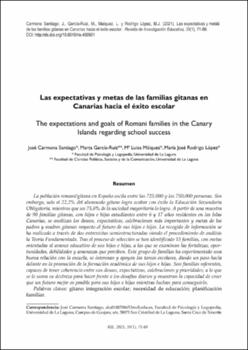Las expectativas y metas de las familias gitanas en Canarias hacia el éxito escolar
Fecha
2021Resumen
La población roma/gitana en España oscila entre las 725.000 y las 750.000 personas. Sin embargo, solo el 22,2% del alumnado gitano logra acabar con éxito la Educación Secundaria Obligatoria, mientras que un 75,6% de la sociedad mayoritaria lo logra. A partir de una muestra de 90 familias gitanas, con hijos e hijas estudiantes entre 6 y 17 años residentes en las Islas Canarias, se analizan los deseos, expectativas, celebraciones más importantes y metas de los padres y madres gitanas respecto al futuro de sus hijos e hijas. La recogida de información se ha realizado a través de dos entrevistas semiestructuradas siendo el procedimiento de análisis la Teoría Fundamentada. Tras el proceso de selección se han identificado 15 familias, con metas orientadas al avance educativo de sus hijos e hijas, a las que se examinan las fortalezas, oportunidades, debilidades y amenazas que perciben. Este grupo de familias ha experimentado una buena relación con la escuela, se interesan y apoyan las tareas escolares, dando un paso hacia delante en la promoción de la formación académica de sus hijos e hijas. Son familias referentes, capaces de tener coherencia entre sus deseos, expectativas, celebraciones y prioridades; a lo que se le suma su destreza para hacer frente a los desafíos diarios y muestran la capacidad de creer que un futuro mejor es posible para sus hijos e hijas mientras luchan para conseguirlo. The Romani population in Spain ranges between 725,000 and 750,000 people. However, only
22.2% of gypsy students successfully finish Compulsory Secondary Education, while 75.6% of
majority-population students manage to complete their studies. Drawing from a selected sample
of 90 Romani families with sons and daughters aged 6-17 living in the Canary Islands, we
analyse the most important wishes, expectations, celebrations and goals that Romani fathers
and mothers share regarding the future of their children. Results have been collected using two
semi-structured interviews, with Grounded Theory as our main research methodology. After
the selection process, only 15 families with goals aimed at the educational advancement of their
children were identified, families who perceive and experience specific strengths, opportunities,
weaknesses and threats examined in this article. This group of families enjoy a positive relationship with the school, showing interest, support and caring about their children’s school
tasks. It is this commitment that has helped them take a step forward in the promotion of their
children’s academic training. They are referents, their wishes, expectations, celebrations and
priorities being consistent with one another. They also have the ability to face daily challenges
and believe that a better future for their children is possible, even as they struggle to make it
happen.






